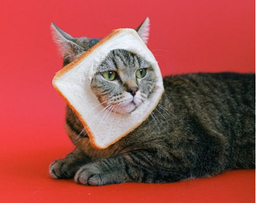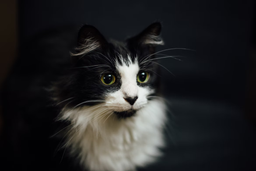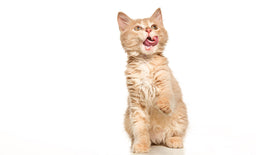Does your cat have the munchies? Learn what to do when your cat won’t stop eating
Is your cat in a feeding frenzy? While we don’t have the heart to deny an extra treat or two to our furry friends, we have to be careful about their diet. Some reasons why we should control what and how much our cats eat are apparent (such as potential obesity), but there are plenty of other, invisible reasons why we should limit our felines’ food. Even though we adore kitties of all shapes, overeating shouldn’t be taken lightly because it’s a major health concern.
Has your cat gained a kilo or two? Find out why your cat won’t stop eating and how to get your furry friend’s appetite back to normal!
Is my cat obsessed with food? Signs that you should be worried
Is your furry friend being exceptionally excited for meals and licking the bowl squeaky clean lately? If you’ve been looking for food your fussy cat won’t reject, your feline’s excitement might make you feel like a burden fell off your shoulders. If the obsession with food continues for a while, it might not be a positive sign, especially if your voracious kitty also tries to grab your attention and get more food by:
- Being overprotective of their bowl
- Meowing louder than usual
- Sneaking around and showing interest in the food you’re preparing
- Being (more) impatient at mealtime
- Stealing your or other pets’ food

Daaaaad, he’s sitting next to my food again!
Image (c) Untamed
Why should I be concerned that my cat won’t stop eating?
If your cat has been indulging in more food lately, you will notice that they gained weight, right? Unfortunately, that’s not always the case. Some underlying medical conditions can develop and progress without symptoms or even cause your cat to lose weight despite eating more.
Overeating is not a natural feline instinct. Cats eat to satisfy their energy requirements, and if their diet is nutritious enough, they won’t ask for repeats. If you feel confident that your cat’s diet is appropriate, but they still ask for more food throughout the day, that can be a sign of:
- Medical problems
- Changes in activity levels and outdoor temperatures
- Psychological problems
- Pregnancy
- Medication side effect
Medical problems associated with excessive eating in cats
The most common reason for excessive eating in cats are these medical conditions:
|
Condition |
Description |
|
Parasites |
These harmful creatures absorb the nutrients your feline is supposed to, so your cat is trying to compensate for it. If your cat is always hungry and losing weight, parasites in the small intestine might be the culprits |
|
Diabetes |
This condition does not allow the feline body to absorb glucose from the blood. As a result, fats and proteins in your cat’s body start to break down to provide energy |
|
Thyroid issues |
An overactive thyroid (hyperthyroidism) increases your cat’s hunger and thirst |
|
Nutrient malabsorption |
When your cat’s small intestine is unable to absorb nutrients from food, your furry friend will try to compensate for the lack of protein, fat, vitamins, minerals, and other essential nutrients by eating more |
|
Cancer |
This condition impacts feline metabolic processes and increases cat’s energy needs, which is why cats with cancer often suffer from muscle loss. If you notice your cat begging for food all the time while maintaining or losing weight, that might be because of a cancer |
The impact changes in activity levels and outdoor temperatures have on a cat’s appetite
If your cat spends a lot of time outdoors, they might eat more than an indoor-only cat because of the energy they spend. During winter, cats need more energy to generate warmth, which—also depending on their activity—will most likely require a heftier diet.
Even though these circumstances can increase your furry friend’s appetite, that food surplus shouldn’t go beyond reasonable limits, and your cat shouldn’t be begging for food all the time.
Psychological problems as the reason why your cat won’t stop eating
Do you ever get the munchies when you’re blue or stressed? Guess what—your cat can, too! Some of the psychological states that can make your feline companion overeat are:
- Boredom
- Depression
- Anxiety
- Stress
You must wonder what makes cats stressed out so severely that they overeat. Some typical stressors are:
- Inconsistent feeding time and amount
- Other pets stealing your cat’s food and bullying them
- Introduction of a new pet

Is he gone yet? Can I eat now?
Image (c) Untamed
Can overeating be a sign of pregnancy?
Is your cat always hungry and gaining weight? Parents of female cats, rejoice because a litter might be on its way! If your cat got significantly bigger, you might even notice some movement around the belly.
During pregnancy, queens can eat up to three times more than usual so make sure you stock up on food.
Is my cat always eating because of their medication?
Despite it not being their primary use (and more of a side effect), some medication can increase your furry friend’s appetite. Check your cat’s weight and eating habits regularly if they are taking some of these medications:
|
Medication |
Use |
|
Synthetic progestin (megestrol acetate) |
|
|
B vitamins |
|
|
Glucocorticoids |
Treating various inflammatory illnesses, for example:
|
|
Mirtazapine |
Treating gastrointestinal problems, such as:
|
|
Anxiolytics (benzodiazepines) |
|
|
Antihistamines (cyproheptadine) |
Treating:
|
Is your cat overweight? Find out now!
Your cat’s healthy weight depends on many factors, such as their breed, age, gender, and size. There are ways to determine whether your cat is fit or on the rounder side without using a scale. Let’s check whether your cat has put on some extra kilos:
|
What to do |
Signs your cat is overweight |
|
Look at your cat from above. Look for dips between the ribs and legs |
You can’t see the little dips between their ribs and legs, and they look overall rounder |
|
Feel your cat’s back and ribs. You should be able to feel the bones with light pressure |
You’re unable to feel their bones without applying more pressure |
|
Look at your cat from a slight distance. Does your furry friend have a protruding belly? |
They have a protruding belly with a hanging layer of fat at the bottom |

What are you looking at? I have a thick coat—that’s all!
Source: Racool_studio
My cat will not stop eating. What should I do?
If your cat seems adamant in their efforts to eat the entire house, it’s time to visit the vet. If you can’t reach the vet, there are ways you can slow down your hungry feline until you find another specialist. You can stop your cat from eating a lot of food at an astounding speed by:
- Using special toys
- Serving petite food portions
- Switching to a wet-food-only diet
Is your cat asking for food? With special toys, you don’t have to say “no”!
Many cats and dogs eat either too much or too quickly, often making themselves sick. That’s why you can find various toys on the market that will help your kitty go easy on food, such as:
- Licking mats—These simple but handy products are silicone mats with ridges that make your furry friend try harder to reach the food. Your kitty will burn calories and eat at a significantly slower pace
- Food puzzles—Your cat will either love or hate food puzzles. If your feline companion doesn’t lose interest initially, this helpful product will slow down all of your cat’s future meals. You can start from beginner puzzles and gradually switch to more complex ones if your cat is cracking the simpler ones too fast
If your cat wants food all the time, petite food portions might be the way to go
Your cat is yodelling for food for hours at this point, and you can’t do anything about it so you give in. You shouldn’t be generous with food until the vet determines why your cat won’t stop eating, but if you have to do it to calm your furry friend down, you should serve tiny meals. Feeding your cat with the same daily amount of food, but in petite portions, might trick them into thinking they got a lot of food and buy some time until you take them to the vet.
If your cat can’t stop eating, switching to a wet-food-only diet can help
Your kitty might be eating a lot to compensate for the lack of nutrients in their current food. A portion of high-quality wet food is typically more nutritious and has a lesser caloric value than dry food per same meal size.
If you’re looking for wet cat food that’s as nutritious as it is delicious, try Untamed! Our recipes won the hearts of many felines and cat parents alike because:
- We use fresh, human-grade ingredients
- The ingredients undergo gentle steaming to lock in all the nutrients and flavours
- In the production process, we don’t use anything we wouldn’t eat ourselves
- Your cat’s health is a priority, and quality food can make all the difference (we learned that from our furry friends)

MOOOOM, isn’t that supposed to be in my bowl?!
Image (c) Untamed
What happens at the vet’s office?
To determine why your cat is insatiable, your vet will perform various tests on your furry friend’s:
- Urine
- Stool
- Blood
The vet will suggest further testing if they have any suspicions about an underlying condition. After all of the analyses, the vet could suggest an appropriate diet or medication.
How to be a pawsome cat parent and help your kitty regulate their diet
If the vet estimates that your cat needs a special diet for their condition, you should follow through with the instructions. Parents of overweight cats typically have more freedom regarding food choices as long as their furry friends:
- Stay in a caloric deficit until they reach a healthy weight
- Get all the essential nutrients, as follows:
- Proteins
- Fats
- Vitamins
- Minerals
- Fibre
- Water
How to choose the purrfect food for your munchkin!
Are you unsure whether the food you chose for your cat is good enough? Here are some nutrient guidelines to help you check:
|
Essential nutrient |
Content in food (in %) |
|
Protein |
Over 50 |
|
Fat |
Up to 20 |
|
Carbohydrate |
Under 3 |
Ideally, cat food should have at least 70% moisture, recommended as per the moisture content found in wild prey.
If you have trouble reading labels, need advice on which foods to avoid, or think the brand you chose seems fishy, you can always consult your vet about the food’s quality.
Untamed recipes are formulated by veterinarians. Our vision came to be when one of our member’s furry friends, Sian, was severely ill. With the help of a fantastic vet, Sian switched to a whole meat diet and has shown immense progress since then.
With Sian’s story in mind, our team decided to help cat parents make that pawsitive switch as effortlessly as possible. If you’re looking for vet-approved cat food, Untamed is the way to go!
How to ensure your avid feline doesn’t breach the caloric deficit
To make sure your cat follows through with the caloric deficit, you need to calculate the amount of food your kitty can eat a day.
Adult cats need 40–45 calories per kilo of healthy weight. For example, if the healthy weight for your Siamese cat is about five kilos, they will have to eat 240–350 calories a day, depending on their activity and other factors.
Now that you have the healthy range, you need to deduct food equal to approximately one kilo of healthy weight from it. In the case of our Siamese here, that would be 48–70 calories less. In conclusion, an overweight Siamese that should weigh five kilos should eat around 190–280 calories a day to lose weight.
As your kitty approaches the target weight, you can reduce the caloric deficit accordingly. Keep in mind that weight loss takes time, and praise your kitty every chance you get!
Maintain your cat’s pawsome figure with Untamed
Once your cat recovers from binge eating, it’s time to think about long-term weight control—something we can help with. Our recipes come in purrfectly sized portions and ready for serving! Visit our Try Now page to get your purrsonal starter box!
Untamed—more than cat food
Untamed is more than cat food—our goal is to improve every cat’s and cat parent’s life without harming the planet. Our nutritious meals:
- Come in recyclable packaging
- Save you time because they don’t require additional preparation
- Come in jelly and gravy formulas to satisfy the delicate taste buds of fussy cats
Wondering what to expect from our tailor-made cat food? Members of our constantly-growing pack were thrilled to inform us about the following improvements:
- Better digestion
- Fewer hairballs
- A luscious coat that’s as shiny and soft as ever (wait until you start cuddling!)
- More energy for playtime
- Fewer allergic reactions thanks to our hypoallergenic meals
How to get your paws on your purrsonal meal plan
Forget about driving to a particular store to get that special food your kitty loves. What if we told you that you could order the best cat food online, and your furry friend will go wild when it's delivered at your doorstep? The process is as easy as 1-2-3:
- Visit our Try Now page
- Tell us about your feline companion
- Select a meal plan and complete the order
The order will be delivered to you within a day, and our shipping is always free. If you and your kitty are happy with the starter box, we will deliver a fresh batch of Untamed goodies every month around the same time. Our cosy cat food subscription will ensure you never have to waste time hunting for pet pantry supplies!
All our products have a shelf life of three years—our food tastes and smells awesome whenever you open a can!
You can modify, cancel, postpone, or pause a delivery anytime!

Is it Christmas, or did I miss something?
Image (c) Untamed
Tips and tricks on keeping up with the fantastic new diet
The work doesn’t stop once your kitty reaches the target weight. It takes a lot of effort to keep that weight in check, but with these tips and tricks, your kitty’s new healthy lifestyle will turn into a habit in no time! To ensure your furry friend stays catwalk ready, you should:
- Offer treats, but in moderation—Treats should be exactly what their name says—treats, not lunch or dinner. An occasional snack becomes a much bigger deal to your feline companion if offered sparingly
- Talk with your housemates about meals—Your cat will probably try to get extra food by begging all housemates. Keep a feeding record on a visible spot in your home, so everyone knows that your kitty already ate
- Be consistent—Your furry friend has the best chances of maintaining their healthy weight if you are consistent with mealtimes and food choices. Once you find what works for you and your kitty, don’t change it! You should also avoid moving the feeding area or implementing any other changes in your feeding routine as it may cause stress and food rejection

![Best food for Ragdoll cats in the UK [Broken Down]](http://untamed.com/cdn/shop/articles/featured_best_food_for_ragdoll_cats_uk.jpg?v=1646818249&width=256)

